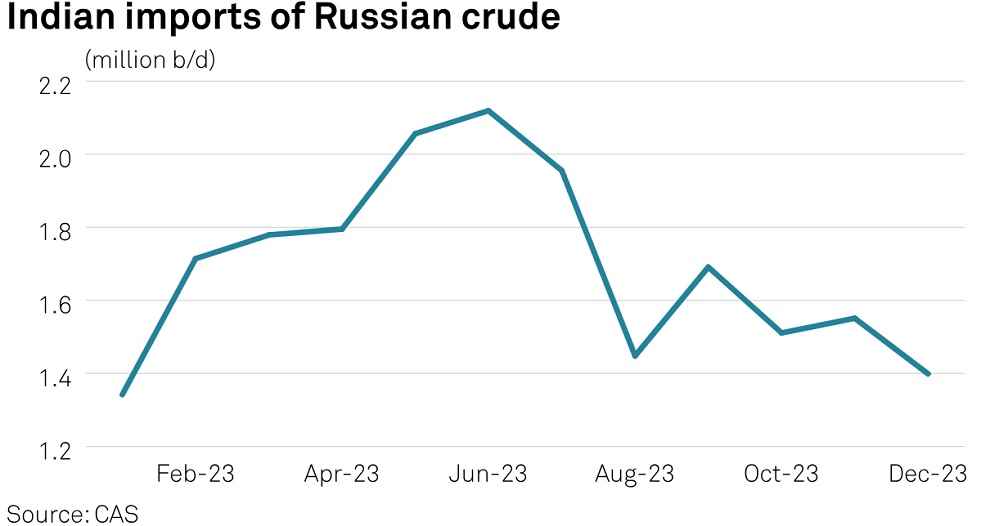Recent trends indicate a temporary ebb in India’s Russian crude oil imports, catalyzed by enhanced Middle Eastern oil influx, extensive refinery maintenance, and vigilant monitoring of shipments from Russia. Experts anticipate a resurgence in demand, solidifying Russia’s role as India’s top oil supplier for the foreseeable future.
June records showed Indian refineries importing an all-time high of 2.1 million barrels per day (b/d) of Russian crude, a figure that stood at 1.69 million b/d by September. S&P Global Commodities at Sea data reveals a slight decrease in these numbers, yet Russia still accounts for about 33-35% of India’s total crude imports.
Factors contributing to this temporary decrease in Russian imports include increased maintenance activities during October and November and a rise in imports from Middle Eastern countries such as Iraq, the UAE, Saudi Arabia, and Kuwait. Shipping logistics and insurance issues have also played a role, as noted by Sumit Ritolia, a refinery economics analyst at S&P Global Commodity Insights.

India’s peak maintenance period in October affected its refinery crude distillation units, with major facilities like Reliance Industries’ 630,000 b/d unit undergoing routine maintenance. Reliance’s strategic increase in Russian fuel oil imports to leverage high middle distillate margins has been a significant move, according to S&P Global.
External challenges like heightened freight costs and difficulties in managing rupee payments to Russia have contributed to the recent decrease in Russian crude imports, states Rajat Kapoor, managing director for oil and gas at Synergy Consulting.
Fluctuations in oil imports reflect Indian refiners’ strategic adjustments. With crude prices now below the $80/b mark and an anticipated rise in European diesel demand, Indian refineries are likely to boost their operations, leading to a steady increase in Russian crude volumes. The easing of sanctions on Venezuelan crude also presents Indian refiners with new opportunities for diversifying their oil imports.

Trade sources and analysts anticipate a return to higher levels of demand for Russian oil. They also highlight concerns over escalating shipping costs and insurance. The entry of Venezuelan crude into the market adds complexity to India’s oil import strategy, presenting new choices for the country’s refiners.
India’s recent engagement with Venezuelan crude, marked by the procurement of November- and December-loading cargoes, signifies a strategic shift in the global oil trade, challenging the dominance of Chinese independent refiners.
As the global oil market responds to these changing demands and geopolitical nuances, India’s approach to balancing its energy requirements with strategic international relations continues to be a key topic in the realm of global energy discussions.
AEROSPACE AND DEFENCE | Red Sea Attacks by Houthis Jolt Global Trade, Spark Security Alarms



